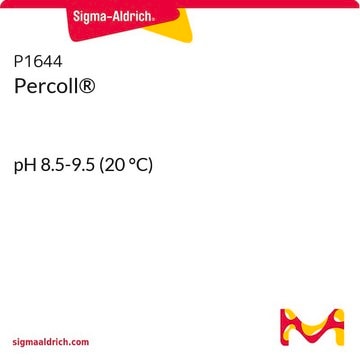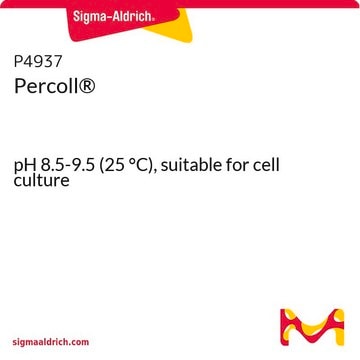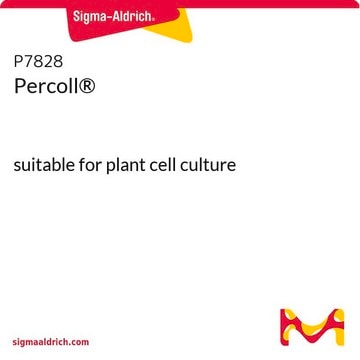GE17-0891-02
Percoll®
Cytiva 17-0891-02, pack of 250 mL
Synonym(s):
Percoll Density Gradient Media
About This Item
Recommended Products
form
colloidal (Colloidal solution of silica coated with polyvinylpyrrolidone (PVP))
liquid (Suspension)
solution
packaging
pack of 250 mL
manufacturer/tradename
Cytiva 17-0891-02
color
Colorless to slightly yellow
pH range
8.5-9.5
General description
Percoll® is a low viscosity density gradient medium for preparation of cells, subcellular particles, and larger viruses. The low viscosity of the medium enables cell preparation on preformed gradients in only a few minutes using low centrifugal forces (200 to 1000 × g). The medium is available in easy-to-open, resealable 250 mL and 1 l bottles.
Percoll® consists of silica particles (15 to 30 nm diameter) coated with non-dialyzable polyvinylpyrrolidone (PVP). Free PVP is present at only 1% to 2%. Percoll® is non-toxic, almost chemically inert and does not adhere to membranes. Percoll® gradients can be formed within the density range of 1.0 to 1.3 g/mL, and are iso-osmotic throughout.
Percoll® can be stored unopened at room temperature for five years. At -20° C, it can only be stored for up to six months. If stored at -20° C, gradients form upon thawing, necessitating a mixing of the bottle before use. Preformed gradients can be stored for weeks without a change in gradient shape, provided that the gradient remains unfrozen. Percoll® can be buffered within the pH range 5.5 to 10.0 without any changes in properties. If the pH is dropped below 5.5, gelling may occur. Gelling can also be caused by the presence of divalent cations, an effect which is exacerbated by elevated temperatures.
Application
Features and Benefits
- For separation of cells, subcellular particles and larger viruses (down to ~ 70S) under gentle conditions which preserve viability and morphological integrity.
- Non-toxic to cells.
- Adjustable to physiological ionic strength and pH.
- Gradients can either be preformed or spontaneously generated by centrifugation at moderate speeds in an angle-head rotor.
- Gradients are iso-osmotic throughout and cover a range of densities up to 1.3 g/mL.
Storage and Stability
Analysis Note
Legal Information
Storage Class Code
12 - Non Combustible Liquids
WGK
WGK 3
Flash Point(F)
Not applicable
Flash Point(C)
Not applicable
Choose from one of the most recent versions:
Certificates of Analysis (COA)
Sorry, we don't have COAs for this product available online at this time.
If you need assistance, please contact Customer Support.
Already Own This Product?
Find documentation for the products that you have recently purchased in the Document Library.
Customers Also Viewed
Protocols
To prepare a Percoll gradient, the osmolality of Percoll must be adjusted with saline or cell culture medium to make Percoll isotonic with physiological salt solutions.
To prepare a Percoll gradient, the osmolality of Percoll must be adjusted with saline or cell culture medium to make Percoll isotonic with physiological salt solutions.
To prepare a Percoll gradient, the osmolality of Percoll must be adjusted with saline or cell culture medium to make Percoll isotonic with physiological salt solutions.
To prepare a Percoll gradient, the osmolality of Percoll must be adjusted with saline or cell culture medium to make Percoll isotonic with physiological salt solutions.
Our team of scientists has experience in all areas of research including Life Science, Material Science, Chemical Synthesis, Chromatography, Analytical and many others.
Contact Technical Service












